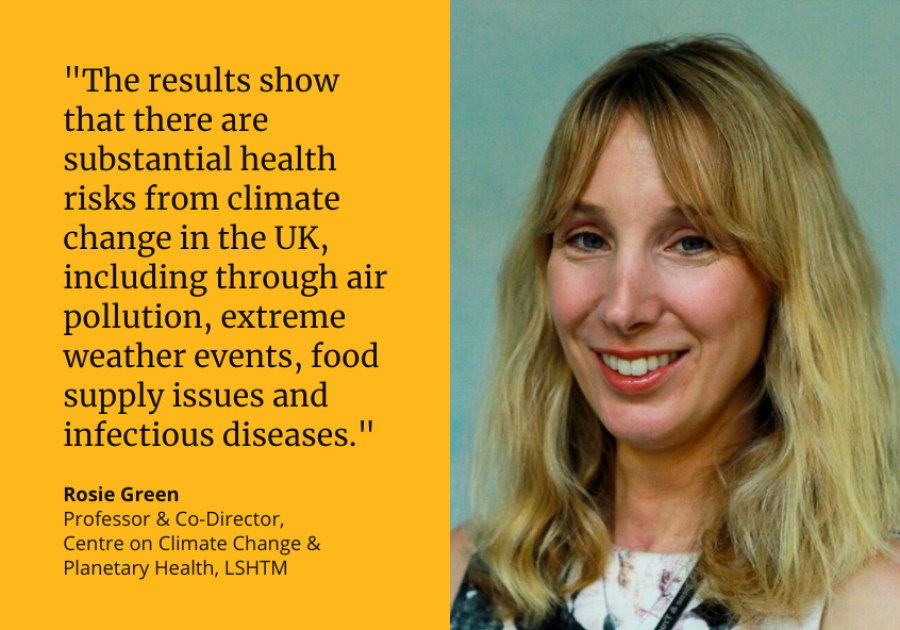Expert Comment – UKHSA report says changing climate already impacting health
11 December 2023 London School of Hygiene & Tropical Medicine London School of Hygiene & Tropical Medicine https://lshtm.ac.uk/themes/custom/lshtm/images/lshtm-logo-black.png
A new report released today (Monday 11 December) by the UK Health Security Agency (UKHSA) has drawn together the latest evidence on how a changing climate is already impacting UK health.
The first Health Effects of Climate Change (HECC) report highlights the substantial and growing evidence of a direct impact of climate change on health, through 15 chapters written and peer-reviewed by a wide range of experts, including researchers from the NIHR-funded Health Protection Research Unit in Environmental Change and Health at the London School of Hygiene & Tropical Medicine (LSHTM).
The report is the first of its kind produced by UKHSA and stresses that health threats, such as extreme heat, infectious disease risk, flooding, and food security, will become more significant in the near future and urgently need addressing.
Dr Rosie Green, Professor of Environment, Food and Health, and Co-Director of the Centre on Climate Change and Planetary Health at LSHTM, co-led the food supply chapter of the report. It explores explores the vulnerability to climate change of the places where we source our food and the potential impacts of supply shortfalls for our health.
It shows that the UK’s supply of healthy foods such as fruit and vegetables is particularly at risk, as nearly 80% of these foods are imported, often from countries highly vulnerable to climate change.
Professor Green said: “In the UK, we are used to being able to find foods from all over the world in our shops at any time of year but climate change is going to make that an increasingly difficult prospect.
“If healthy foods become harder to obtain or more expensive due to climate change, people will increasingly choose cheaper and less perishable foods that are likely to be worse for their health.
“It will be vital for the UK to invest in climate-resilient food production in the countries where we source our food, as well as supporting production at home for healthy foods that can be grown in the UK.
“The new HECC report comes at a time when the spotlight is on the UK as a wealthy nation to lead the way in its response to the climate crisis.
“The results show that there are substantial health risks from climate change in the UK, including through air pollution, extreme weather events, food supply issues and infectious diseases. However, the report also indicates a number of positive benefits to health that could be achieved if we take action to adapt to these risks and to mitigate greenhouse gas emissions.
“We now need to start taking ambitious actions to safeguard our health under a changing climate.”
The report also examines the future relationship between temperature and mortality in climate change. Using a high-emissions scenario, UK-heat related deaths are estimated to increase by one and a half times in the 2030s and by 12 times by 2070.
Dr Peninah Murage, Assistant Professor at LSHTM, co-led the second chapter on temperature effects on mortality in a changing climate.
Dr Murage, whose research examines the health effects of changes in the environment and generates evidence to support the rapid transition to a zero-carbon future, said:
“Understanding the future health burdens associated with heat and cold exposure will help decision makers in health and social-care better understand future changes in health risks and put arrangements in place to protect populations.
“This is urgent, as the UK climate is projected to be warmer, and the population increasingly older, which will increase overall risks to health.”
Sir Andy Haines, Professor of Environmental Change and Public Health at LSHTM, said that multiple threats to health from climate change will also amplify existing inequities in health.
He said: “There will also be geographic variation in impacts. For example, heat exposure is higher in urban areas and the risks of flooding are higher for populations living in low-lying areas and coastal regions.”
The UKHSA Effects of Climate Change report also sets out where the UK currently stands in terms of reaching its Net Zero targets, and what needs to be considered in the years to come in order to continue on that pathway.
LSHTM's short courses provide opportunities to study specialised topics across a broad range of public and global health fields. From AMR to vaccines, travel medicine to clinical trials, and modelling to malaria, refresh your skills and join one of our short courses today.